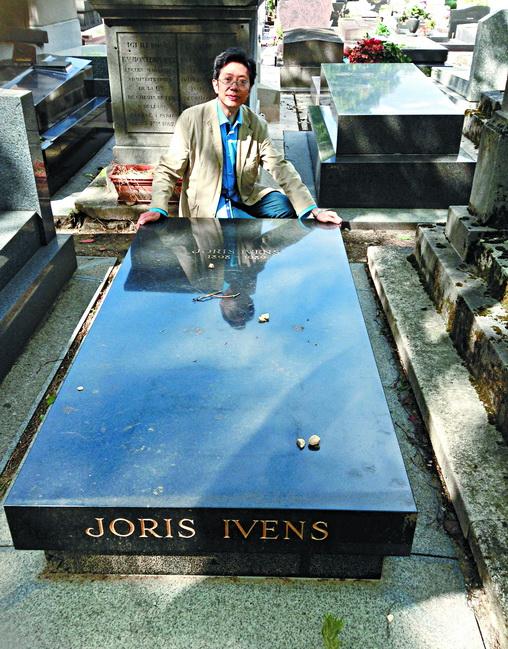I have just combed through Evans's film life, but I suddenly remember that a few years ago, I once went to France to visit the graveyard of the "father of documentary cinema", and I forgot about it until I found a photo in evans' cemetery. It was the summer of 2013, and I was traveling with a friend to the Cemetery of Montparnasse in Paris, and I came across Evans' tomb there.
<h4>Author: Xu Yi</h4>

As we all know, in the 1920s, the Montparnasse region of Paris was a large number of artists and literati, including such outstanding artists as Modigliani, Chagall, Giacometti and so on. Here, there are also a number of immortal literati, such as Baudelaire, Simone de Beauvoir and Sartre, Duras, Beckett and so on. However, to my surprise, I would have met Evans here unexpectedly. Perhaps in the darkness, the adventure of this cemetery is some kind of "entrustment".
Because at that time, the publication process of the book "Evans and Documentary Film" was stagnant for various reasons, and it was difficult to advance, and it was even possible to abandon it. The content of this book is not only the research results of documentary scholars in various countries on Evans's films, but also evans' own literature on documentary films, and the testimony of Evans's cooperation with China, who for the first time disclosed a lot of little-known first-hand information. Because of this, the complexity of its editing and translation is unprecedented. Admittedly, Mrs. Evans generously allowed the inclusion of Evans' own discourse, laying the groundwork for the eventual publication of the book.
But when Mrs. Evans learned that we were also preparing to publish Evans's biography and had bought the rights to the biography of the Dutch historian Hans Schütz, she hid her dissatisfaction and depression and strongly recommended an interview that Evans had published during his lifetime. Biographer Hans Schütz, who received his approval as a journalist interviewing Evans in his later years, confessed that Hans Schütz spoke his mind, which also inspired the Dutch scholar's desire to explore the relationship between politics and art. To study Evans' film life from a historical perspective, I think most people who pay attention to Evans' films agree. Moreover, the book I have chosen is the only biography of Evans in the world today.
In fact, the 500-page biography, Living dangerously: A Biography of Evans, was published in 1995 and has been recognized by the Evans European Foundation. Biographers have read more than two thousand letters, browsed fifteen to twenty thousand documents, and a great deal of other related materials. Among them, the archives opened by some national government departments have helped the author a lot, and as for the interviews with relevant parties, the author believes that the interviews as historical sources are unreliable, he said: "Because all memories are selective, in the most favorable situation for the interviewee, the interviewee is often deliberately misled." "Biographers therefore need to compare information from various sources so as not to go astray and cause unnecessary errors.
There is a disagreement between Mrs. Evans and the biographer as to what view of history is based. Although Marceline did a lot of interviews with the author, before the book was written, she was convinced that the book would be somewhat "destructive" and eventually withdrew the right to use the information she provided. These, the author of the biography have truthfully stated in the book. Now, after several twists and turns, the Chinese edition of the book has finally arrived, when news of Marceline's death has arrived from Paris. Is this some kind of coincidence?
As a follower of Evans' films, I had the privilege of getting to know her wife during her last visit to China. I found that she was very concerned about the future of the country, not only the work partners she had worked with, but also the unfinished ideals she and Evans had left behind, and she seemed to be looking for something in the footsteps of the past. She pins her hopes on young people, and she likes to speak freely with young people from different backgrounds.
In the last years of Marceline's life, she earned her a number of accolades by making a film revisiting Auschwitz and publishing several books on memories of life in the camp. Perhaps, she still wanted to do something for China, but due to her age and energy, she ultimately failed to do so. Like Evans, she left with too much anticipation and regret.
They came and went, and then they came and went, and they came and went, leaving behind images and memories.
<h4>(Original title: Memories of montparnasse's tombside).</h4>
<h4>Source: Beijing Evening News</h4>
<h4>EDIT: TF016</h4>